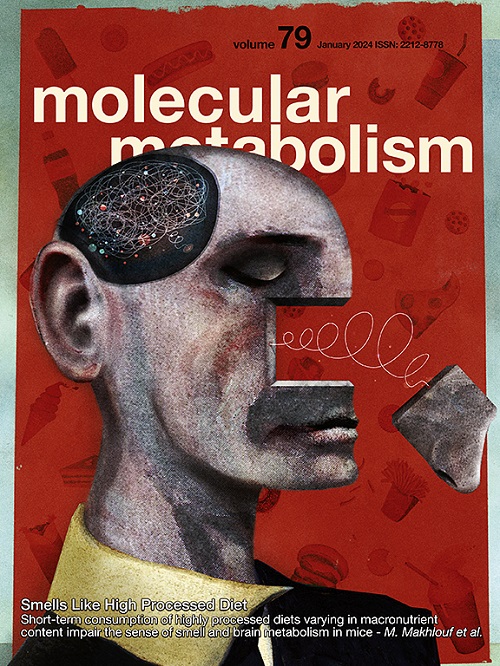CaMKII神经元中的大麻素1型受体驱动病理性饮食行为的冲动。
IF 7
2区 医学
Q1 ENDOCRINOLOGY & METABOLISM
引用次数: 0
摘要
当食物匮乏时,过度食用美味食物和能量积累是生存的进化机制。这种先天机制在致肥环境中变得有害,促进肥胖和相关的合并症,包括情绪障碍。内源性大麻素系统有利于能量积累并调节奖赏回路。在CB1缺乏的背景下,我们应用遗传策略分别在CaMKII+神经元(CaMKII-CB1- rs)和脂肪细胞(ti-CB1- rs)中重建大麻素1型受体(CB1)的功能水平表达。CaMKII+神经元中获救的CB1表达,而不是脂肪细胞中的CB1表达,促进了摄食行为,导致禁食诱导的贪食,增加了寻找美味食物的动机和冲动。在饮食诱导的肥胖模型中,与CB1完全缺乏相比,CB1在CaMKII+神经元中重新表达,而不是在脂肪细胞中重新表达,足以在很大程度上恢复体重增加和食物摄入,而不会对与高脂肪饮食消耗相关的葡萄糖耐受不良产生任何影响。在糖皮质激素介导的代谢综合征模型中,CaMKII-CB1-RS小鼠显示出除葡萄糖耐受不良外与人类代谢综合征相关的所有代谢改变。在模拟人类病理进食的暴饮暴食模型中,CaMKII-CB1-RS小鼠显示出对美味食物的寻找和强迫行为增加,这表明在觅食和对成瘾性饮食行为的敏感性增强中起着关键作用。重要的是,其他偶然行为,包括增加认知灵活性和减少焦虑样行为,但没有抑郁样行为,也被观察到。综上所述,CaMKII+神经元中的CB1在生理条件下参与摄食行为和能量储存。暴露于危险因素(高热量饮食、糖皮质激素失调)会导致肥胖、代谢综合征、暴饮暴食和食物成瘾。本文章由计算机程序翻译,如有差异,请以英文原文为准。
Cannabinoid type-1 receptors in CaMKII neurons drive impulsivity in pathological eating behavior
Objectives
Overconsumption of palatable food and energy accumulation are evolutionary mechanisms of survival when food is scarce. These innate mechanisms becom detrimental in obesogenic environment promoting obesity and related comorbidities, including mood disorders. This study aims at elucidating the role of the endocannabinoid system in energy accumulation and hedonic feeding.
Methods
We applied a genetic strategy to reconstitute cannabinoid type-1 receptor (CB1) expression at functional levels specifically in CaMKII+ neurons (CaMKII-CB1-RS) and adipocytes (Ati-CB1-RS), respectively, in a CB1 deficient background.
Results
Rescued CB1 expression in CaMKII+ neurons, but not in adipocytes, promotes feeding behavior, leading to fasting-induced hyperphagia, increased motivation, and impulsivity to palatable food seeking. In a diet-induced obesity model, CB1 re-expression in CaMKII+ neurons, but not in adipocytes, compared to complete CB1 deficiency, was sufficient to largely restore weight gain, food intake without any effect on glucose intolerance associated with high-fat diet consumption. In a model of glucocorticoid-mediated metabolic syndrome, CaMKII-CB1-RS mice showed all metabolic alterations linked to the human metabolic syndrome except of glucose intolerance. In a binge-eating model mimicking human pathological feeding, CaMKII-CB1-RS mice showed increased seeking and compulsive behavior to palatable food, suggesting crucial roles in foraging and an enhanced susceptibility to addictive-like eating behaviors. Importantly, other contingent behaviors, including increased cognitive flexibility and reduced anxiety-like behaviors, but not depressive-like behaviors, were also observed.
Conclusions
CB1 in CaMKII+ neurons is instrumental in feeding behavior and energy storage under physiological conditions. The exposure to risk factors (hypercaloric diet, glucocorticoid dysregulation) leads to obesity, metabolic syndrome, binge-eating and food addiction.
求助全文
通过发布文献求助,成功后即可免费获取论文全文。
去求助
来源期刊

Molecular Metabolism
ENDOCRINOLOGY & METABOLISM-
CiteScore
14.50
自引率
2.50%
发文量
219
审稿时长
43 days
期刊介绍:
Molecular Metabolism is a leading journal dedicated to sharing groundbreaking discoveries in the field of energy homeostasis and the underlying factors of metabolic disorders. These disorders include obesity, diabetes, cardiovascular disease, and cancer. Our journal focuses on publishing research driven by hypotheses and conducted to the highest standards, aiming to provide a mechanistic understanding of energy homeostasis-related behavior, physiology, and dysfunction.
We promote interdisciplinary science, covering a broad range of approaches from molecules to humans throughout the lifespan. Our goal is to contribute to transformative research in metabolism, which has the potential to revolutionize the field. By enabling progress in the prognosis, prevention, and ultimately the cure of metabolic disorders and their long-term complications, our journal seeks to better the future of health and well-being.
 求助内容:
求助内容: 应助结果提醒方式:
应助结果提醒方式:


